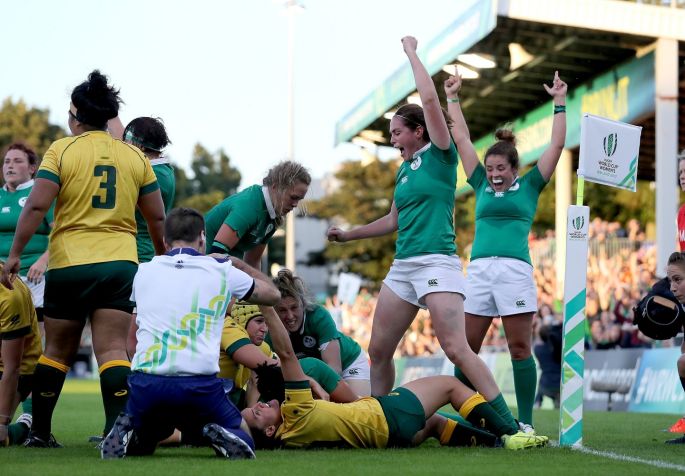University College Dublin’s (UCD) time as host of the pool stages of the 2017 Women’s Rugby World Cup has come to an end with Ireland being beaten 21-5 by France, who now progress to the semi-final. The loss puts France top of Pool C and means that Ireland’s hopes of winning the competition are well and truly over. Ireland will now play Australia on Tuesday in the Kingspan Stadium, Belfast in a fifth place semi-final. The team will be hoping to replicate the performance that they put on earlier in the competition when they secured a narrow two-point victory over the Aussies in a tightly fought contest, which finished 19-17.
Eighteen games in total were played in UCD, nine in both the UCD Bowl and in Billings Park. The competition was a key chance for UCD to showcase their campus to a global audience including prospective student athletes and may prove to be vital in attracting future cups and tournaments. This Women’s Rugby World Cup has been the most viewed yet and the UCD Bowl’s capacity was increased to 16,000 for the duration of the competition. The pitches coped very well with an intense schedule that saw multiple matches being played on any given day.
If any proof was still needed that the women’s game has achieved universal respect it was in the form of the bitter disappointment that swept across the faces of those in attendance during their last defeat
If any proof was still needed that the women’s game has achieved universal respect it was in the form of the bitter disappointment that swept across the faces of those in attendance during their last defeat. The expectations placed upon the women mirrored those routinely placed on the men’s team. RTE’s panel’s post match analysis has been deeply critical of the Irish team at times, making no excuses for below-par displays. A disservice would have been done to the green jersey if any attempt was made to justify what was a lacklustre performance against a French team that Ireland beat in the Six Nations back in February. One must not forget it was the Women’s team that first beat the almighty Kiwis in the last World Cup, long before the men’s epic showdown in Chicago. On that occasion, Ireland finished fourth.
There is certainly an argument to be made that the team could have done a lot better had it not been for a lack of funding that has hindered the team and stifled their progress. In the past the Irish Rugby Football Union (IRFU) has been criticised for offering the women’s team out-dated equipment and ridiculous travel schedules, which saw the team arriving off flights in the early hours of the morning on a match day. However, it’s fair to say Ireland also didn’t show up for the first 30 minutes of the match against France. Most disappointing was the lack of an observable attacking game plan, which may have left the casual viewer uninterested. Crash-ball rugby is only ever appreciated when it is accompanied by a victory. Moreover, there appeared at times to be a lack of communication between both the players and the coaches.
While Ireland may not have achieved what was expected of them in this competition the World Cup, as a whole, has been a success
Nowhere was this more apparent than in the opening half against Japan, which saw Ireland fall behind by 14 points to zero. The biggest issue for the team is a lack of consistency. Head Coach Tom Tierney didn’t know his best 15 when the competition began and he never settled on a team throughout it. This resulted in a team that at times lacked the chemistry that all previous World Cup-winning sides have possessed.
While Ireland may not have achieved what was expected of them in this competition the World Cup, as a whole, has been a success. The media’s exposure of the World Cup this year and women’s rugby sevens in the Olympics last year has introduced many young girls to the idea of playing rugby and will hopefully lead to more women playing for Trinity and other universities.







